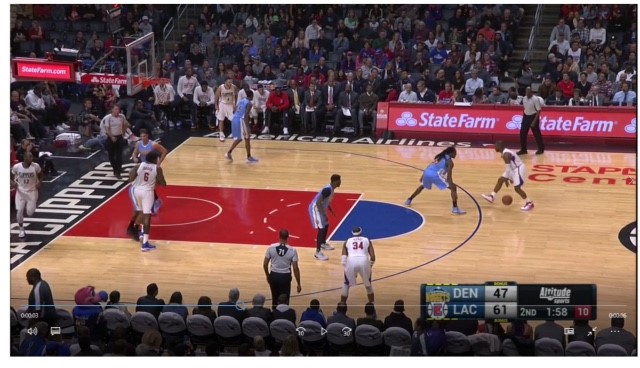Developing an elite jump shooter
Shooting is a motor skill despite many believing that shooting skill is an innate talent. When coaching or teaching young shooters, we concentrate on the sport-specific instruction: the elbow, the eyes, the knee bend, etc. An expert shooter’s technique looks effortless: Even a shooter with an unorthodox technique such as Reggie Miller looks effortless when shooting the basketball. Moshe Feldenkrais wrote, “Light and easy movements are good ones, as a rule” (p. 86). Look at Kevin Durant’s effortless release: [continue reading…]
The shooting stance
Staring, talent development, and the shooting gene
During a Duke University game in the NCAA Tournament, Clark Kellogg exclaimed, “It’s in the genes!” when Duke’s Seth Curry knocked down a three-pointer. This is a common perception, as his brother Stephen was one of the best college shooters of the past decade, and his father Dell was an NBA sharp-shooter. Most people believe this statement: the evidence suggests that the Curry clan possess the shooting gene. [continue reading…]
The problem with form shooting
Slide shooting drill
Why everyone should shoot like Steve Nash
Originally published in Hard2Guard Player Development Newsletter 4.35. Similar articles available in Brian McCormick’s Hard2Guard Player Development Newsletters, Volume 4.
I believe Steve Nash is the best shooter in the NBA, at least since the NBA incorporated the three-point line. Whereas I base my belief primarily on observation, the numbers support the theory. John Hollinger, the creator of the player efficiency rankings, ranks Nash as the all-time #1 shooter based on a combined shooting range (CSR) which adds 2-point percentage, 3-pt % and FT%. [continue reading…]
BELIEF: Shooting technique
Defensive positioning

Shooting coaches and evaluating improvement
During the preseason, I watched the local NCAA Division II shooting guard work out. Last season, she shot 14% from the three-point line. She did not shoot like a 14% three-point shooter.
I asked about her percentage during the previous season. She said that she had no confidence. Her college coach played mind games, substituted on missed shots, and created a negative environment.
I asked her about her goals for the up-coming season. She said that she wanted to shoot 40% from the three-point line. I thought that was optimistic. She does not have the technique of a 14% three-point shooter, but she has some flaws, especially her balance. I thought 35% from behind the arc was a reasonable goal.
Currently, slightly more than midway through the season, on approximately the same number of attempts as last season (moved from a substitute role player to team’s leading scorer), she is shooting 39.2%.
As a shooting coach who has worked with her during the preseason and season, I could promote her success on my resume: Under my tutelage, she improved from 14% to 39%, a very substantial improvement. My coaching is life-changing!
The reality is that she shoots with almost the exact same technique. What caused her improvement? Shot selection and confidence.
When players improve, we attribute the improvement to practice or coaching. After all, the purpose of practice and coaching is to improve, and there is improvement, so it follows that the practice and coaching caused the improvement. However, correlation does not mean causation: just because two things are related does not mean that one caused the other.
In her case, she has a new head coach (Brianna Finch). This coach allows her to play through mistakes and missed shots. The coach empowers her to shoot open shots. Consequently, she does not hesitate. She shoots with confidence. The same player with the same technique will shoot a higher percentage when she feels good about herself, and she shoots with confidence.
Secondly, she takes better shots. The new head coach emphasizes shot selection and works to get open catch-and-shoot shots.
Her improvement can be attributed to the combination of shot selection and confidence. In these instances, a shooting coach (me) often would take credit for her development, and her statistics would support the coach’s marketing. However, improvement stems from many avenues. Often, a shooting coach’s most important contribution is the mental side: Assisting with the player’s confidence. In this case, the shooting coach deserves some credit, but more for his or her sports psychology skills than the shooting instruction.
When a player improves with no discernible difference in technique, other factors account for the improvement. Personally, my shooting improves when I lift weights more regularly, as I have more legs in my shot. Other times, improvement is mental or due to better shots in a different system. Improvement is multi-faceted. I would like to think that I had some effect on the player, but, in truth, I know her head coach deserves the credit for instilling confidence into a broken player and getting the player to take better shots.
It’s amazing what can happen to a player when the coach believes in her.
EDIT: She finished at 37.3% on the season and in the top 10 in her conference while playing almost 3x as many minutes per game.